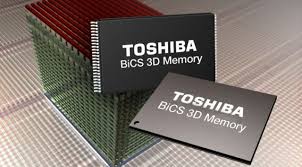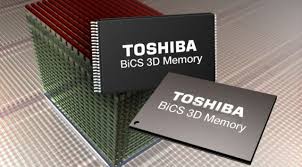
Overcoming a key - albeit not its last - hurdle as it scrambles for funds to stave off a potential delisting, Japan’s Toshiba Corp has already said that it had signed an $18 billion deal to sell its chip unit to a consortium led by Bain Capital LP.
But underscoring fears that the 8-member group contained too many competing interests for it to work well and with Bain saying the consortium could not form a consensus on whether to brief media, a Tokyo news conference on the deal was canceled in an inauspicious sign.
Sources have said that the signing was delayed because consortium member Apple Inc demanded new terms on chip supply even as, after a tortuous auction process, the sale of the unit - the world’s second biggest producer of NAND chips - was agreed last week.
“This consortium has so many members that it is going to be hard to come to consensus and agree on who’s going to take the initiative,” said Hideki Yasuda at Ace Research Institute, but he added that if the sale was successfully completed it would reduce a lot of risks for Toshiba.
the disagreements over the briefing had no bearing on the contract. He did not disclose which members had objected to the news conference, said the disagreements over the briefing had no bearing on the contract. He did not disclose which members had objected to the news conference as the news conference was canceled just minutes before it was due to begin.
Together with Hoya Corp, a maker of parts for chip devices, Japanese firms will hold more than 50 percent of the business - a keen wish of the Japanese government, in Toshiba chip business even as the deal - which must also overcome legal challenges - will see Toshiba reinvest in the unit.
Toshiba said in a statement that in the future, subject to certain conditions, a Japanese state-backed fund and bank have also expressed their interest in investing.
heightening the risk that the deal may not close before the end of Japan’s financial year in March as regulatory reviews usually take at least six months, the auction was drawn out over nine months due to pressure from the Japanese government, changing alliances among suitors and a slew of revised bids.
Toshiba is likely to end a second consecutive year in negative net worth, if the deal does not close before then as Toshiba has been hurt by liabilities at is now bankrupt nuclear unit Westinghouse. And in such a situation, the Tokyo Stock Exchange would be forced to strip it of its listing status.
Also, Western Digital is seeking an injunction to block any deal that does not have its consent, and these legal challenges from this Toshiba’s chip venture partner and rejected suitor are challenges to the deal.
Some $16 billion was paid last year to acquire SanDisk, Toshiba’s chip joint venture partner since 2000 by Western Digital, one of world’s leading makers of hard disk drives. It is desperate to keep the business out of the hands of rival chipmakers and sees chips as a key pillar of growth.
As data storage is key to most next-generation technologies from artificial intelligence and autonomous driving to the Internet of Things, the acrimonious squabbling over Toshiba’s chip unit also highlights the critical importance of NAND memory chips.
(Source:www.reuters.com)
But underscoring fears that the 8-member group contained too many competing interests for it to work well and with Bain saying the consortium could not form a consensus on whether to brief media, a Tokyo news conference on the deal was canceled in an inauspicious sign.
Sources have said that the signing was delayed because consortium member Apple Inc demanded new terms on chip supply even as, after a tortuous auction process, the sale of the unit - the world’s second biggest producer of NAND chips - was agreed last week.
“This consortium has so many members that it is going to be hard to come to consensus and agree on who’s going to take the initiative,” said Hideki Yasuda at Ace Research Institute, but he added that if the sale was successfully completed it would reduce a lot of risks for Toshiba.
the disagreements over the briefing had no bearing on the contract. He did not disclose which members had objected to the news conference, said the disagreements over the briefing had no bearing on the contract. He did not disclose which members had objected to the news conference as the news conference was canceled just minutes before it was due to begin.
Together with Hoya Corp, a maker of parts for chip devices, Japanese firms will hold more than 50 percent of the business - a keen wish of the Japanese government, in Toshiba chip business even as the deal - which must also overcome legal challenges - will see Toshiba reinvest in the unit.
Toshiba said in a statement that in the future, subject to certain conditions, a Japanese state-backed fund and bank have also expressed their interest in investing.
heightening the risk that the deal may not close before the end of Japan’s financial year in March as regulatory reviews usually take at least six months, the auction was drawn out over nine months due to pressure from the Japanese government, changing alliances among suitors and a slew of revised bids.
Toshiba is likely to end a second consecutive year in negative net worth, if the deal does not close before then as Toshiba has been hurt by liabilities at is now bankrupt nuclear unit Westinghouse. And in such a situation, the Tokyo Stock Exchange would be forced to strip it of its listing status.
Also, Western Digital is seeking an injunction to block any deal that does not have its consent, and these legal challenges from this Toshiba’s chip venture partner and rejected suitor are challenges to the deal.
Some $16 billion was paid last year to acquire SanDisk, Toshiba’s chip joint venture partner since 2000 by Western Digital, one of world’s leading makers of hard disk drives. It is desperate to keep the business out of the hands of rival chipmakers and sees chips as a key pillar of growth.
As data storage is key to most next-generation technologies from artificial intelligence and autonomous driving to the Internet of Things, the acrimonious squabbling over Toshiba’s chip unit also highlights the critical importance of NAND memory chips.
(Source:www.reuters.com)














